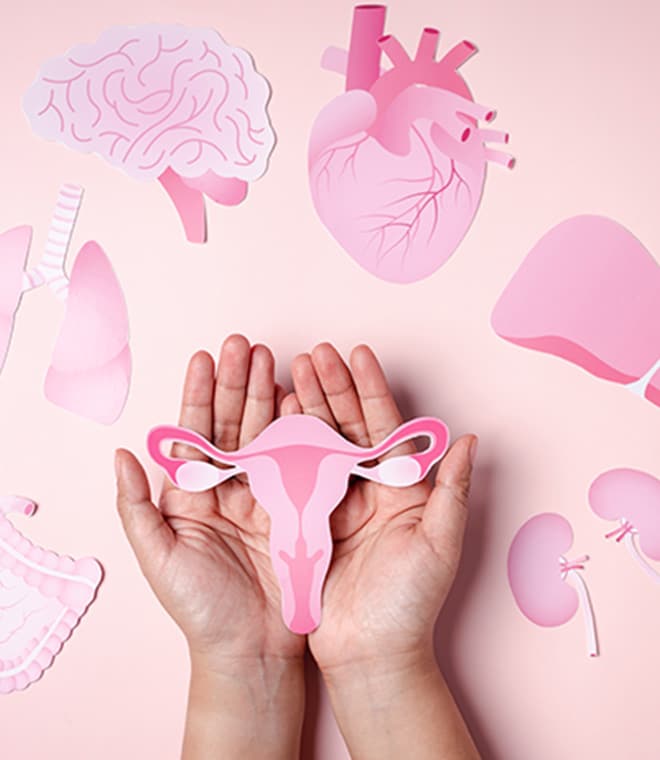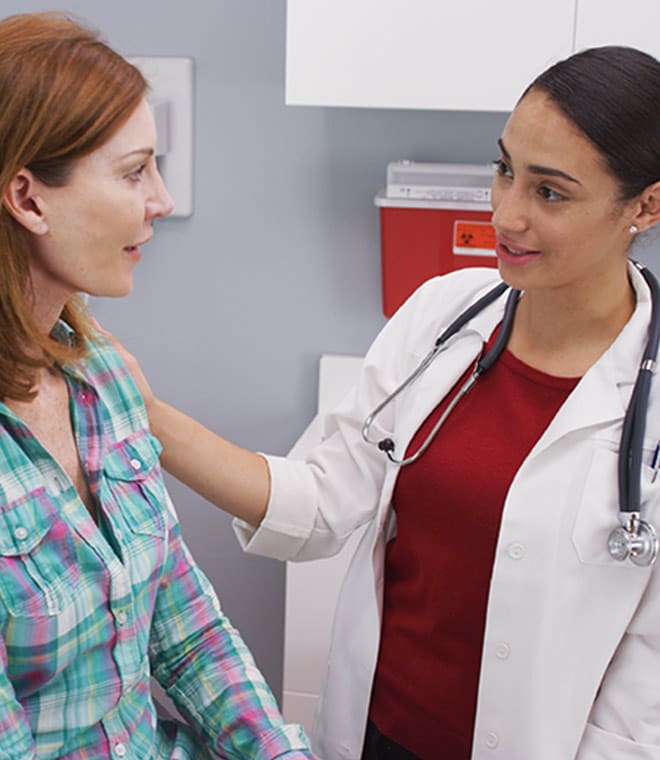Health
Why do some women experience early onset menopause?
By Patricia Ann Convery, MD, Fellow, American College of Obstetrics and Gynecology Mar 20, 2025 • 6 min
When it comes to menopause, each woman has her own unique experience. Some may go through menopause sooner than others. Depending on how soon menopause begins, it may be identified as early or premature menopause.
What is the normal age for menopause?
There is no single “normal” age for menopause. The average age women reach menopause is 52. However, some women may reach menopause in their late 40s or mid-50s. Menopause that occurs after age 45 is generally considered normal.
Menopause begins with perimenopause, which usually starts in your 40s. Once you go without a menstrual period for 12 months and there is no other medical cause to explain the lack of periods, you are considered to be in menopause.
How early can menopause start?
You can experience menopause before your late 40s and 50s. Some women may go through menopause in their 20s, 30s and early 40s. If menopause occurs before the age of 40, it is considered premature menopause. Menopause that occurs at age 40 but before age 45 is early menopause. Around 5% of women naturally experience early menopause.
What causes premature and early menopause?
Early and premature menopause have similar risk factors, which may include the following:
- Genetics: If a close relative like your mother or sister went through early or premature menopause, you’re more likely to experience the same issue. Women with certain chromosomal abnormalities, like Turner’s syndrome and Fragile X syndrome, may also go through menopause sooner than those without these variations.
- Smoking: Women who smoke may go through menopause earlier than those who don’t. Symptoms of perimenopause may also be more severe in women who smoke. Researchers have yet to determine why this is the case. However, some studies suggest that smoking may affect estrogen levels or may have a harmful effect on ovarian aging.
- Cancer treatment: Undergoing pelvic radiation therapy or chemotherapy could damage the ovaries and lead to early or premature menopause. The younger a person is when they go through cancer treatment, the less likely they are to experience menopause at an early age.
- Surgical procedures: If your ovaries are removed during a surgical procedure, you will experience menopause right away, and symptoms are usually intense. Women who undergo a hysterectomy but keep their ovaries may still go through menopause earlier than normal.
- Autoimmune diseases and viral illnesses: Women with an autoimmune disease may experience early menopause. However, this doesn’t happen often. When it does occur, early menopause is usually due to the immune system attacking the ovaries. Some viral infections like mumps may cause early menopause. HIV and AIDS can also cause early menopause if not controlled with medication. Women with HIV usually have more severe hot flashes during perimenopause.
- Myalgic encephalomyelitis/chronic fatigue syndrome (ME/CFS): ME/CFS is a condition that causes tiredness, muscle and joint pain, memory loss, headaches and other symptoms. It has been associated with a higher prevalence of early or premature menopause.
- No identifiable cause: For many women who go through premature or early menopause, there is no clear cause.
What are the signs of premature menopause?
Early and premature menopause symptoms are similar to those that women experience during normal perimenopause. However, they may be more severe, depending on the cause. Symptoms of premature menopause may include:
- Changes in periods, such as timing between periods, heaviness and duration
- Hot flashes
- Night sweats
- Discomfort during sex
- Vaginal dryness
- Bladder symptoms, such as incontinence and frequent urinary tract infections (UTIs)
- Sleep problems
- Mood changes, like irritability, anxiety and depression
- Breast tenderness
- Dryness of the mouth, eyes and/or skin
- Muscle and joint pain
- Changes in sex drive
- Headaches
- Weight gain
- Hair thinning or loss
Signs of early and premature menopause could indicate another possible medical condition, so it’s important to talk to your healthcare provider if you notice any changes in your menstrual periods or other symptoms of early menopause.
Self-care and healthy habits can help
If you’re experiencing early menopause, you can explore lifestyle changes, self-care strategies and treatments like hormone replacement therapy (HRT), which may help ease hot flashes, sleep problems and other symptoms. Taking good care of your body with nutritious food and regular exercise can help you weather the physical symptoms of early menopause. Some women who go through early menopause may experience sadness or other negative emotions, which is considered perfectly normal. A licensed mental healthcare provider can help you address these feelings and enjoy a higher quality of life. You might also consider over-the-counter menopause products to help manage certain symptoms.
Updated by Julie McDaniel, MSN, RN, CRNI, March 2025.
Sources:
- https://www.womenshealth.gov/menopause/early-or-premature-menopause
- https://www.menopause.org/for-women/expert-answers-to-frequently-asked-questions-about-menopause/perimenopause-premature-menopause-faqs
- https://medlineplus.gov/primaryovarianinsufficiency.html
- https://www.ncbi.nlm.nih.gov/pmc/articles/PMC5850221/
- https://womenshealth.gov/menopause/menopause-basics
- https://www.nia.nih.gov/health/menopause/what-menopause
- https://www.merckmanuals.com/home/women-s-health-issues/menstrual-disorders-and-abnormal-vaginal-bleeding/premature-menopause
- https://journals.lww.com/menopausejournal/abstract/2015/10000/life_course_exposure_to_smoke_and_early_menopause.9.aspx
- https://smokefree.gov/quit-smoking/why-you-should-quit/health-effects
- https://pmc.ncbi.nlm.nih.gov/articles/PMC5888979/
- https://www.cdc.gov/me-cfs/hcp/clinical-overview/index.html
- https://medlineplus.gov/menopause.html
- https://www.merckmanuals.com/professional/gynecology-and-obstetrics/menopause/menopause




